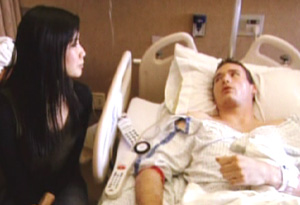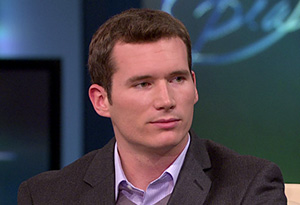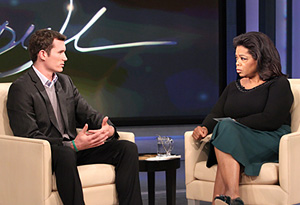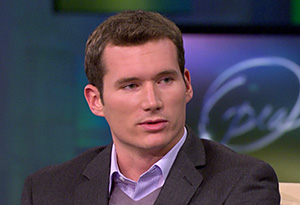Colin Goddard's Life After Virginia Tech

On April 16, 2007, Colin Goddard survived one of the deadliest school shootings in history. Thirty-two people—students and teachers—were killed at Virginia Tech when South Korean undergraduate student Cho Seung-Hui went on a killing spree.
At 9:43 a.m. Cho burst into the room where Colin was attending French class and opened fire. Colin was shot four times—in his left knee, left hip, right shoulder and right hip. "I only remember a couple of gunshots after that, and then everything got quiet," he says.
A day after the shooting, while Colin was still in the hospital, he spoke to Lisa Ling for an Oprah Show special report. "I tried to act dead like I wasn't even moving," he told Lisa. "The next thing you know, the police are kicking the door trying to get in. They said, 'Shooter down.' ... One of the last bullets was for [Cho] himself in front of the classroom."
At 9:43 a.m. Cho burst into the room where Colin was attending French class and opened fire. Colin was shot four times—in his left knee, left hip, right shoulder and right hip. "I only remember a couple of gunshots after that, and then everything got quiet," he says.
A day after the shooting, while Colin was still in the hospital, he spoke to Lisa Ling for an Oprah Show special report. "I tried to act dead like I wasn't even moving," he told Lisa. "The next thing you know, the police are kicking the door trying to get in. They said, 'Shooter down.' ... One of the last bullets was for [Cho] himself in front of the classroom."

Three years later, Colin has graduated college and says he is still largely identified as a survivor. "I've only been a young professional for two years, so I haven't really had any professional accomplishment to be called 'Colin Goddard the author' or 'lawyer.' It's 'Colin Goddard the survivor,'" he says. "I hope at some point, though, that changes."
Colin says he's made a conscious decision to not be a victim. "[You have] the choice of what to do. Do you let this consume you? Do you think about this all day? I thought about the situation changing every single way," he says. "How I could have saved the day or how I could have been killed? And the sooner I accepted what happened, I could then move on and deal with it."
Though he was shot four times, Colin says he didn't feel any pain in the moment. "I felt numb throughout my entire body," he says. "Later I learned that when you're in a very stressful situation your body releases natural endorphins as a painkiller. So I felt the big force of air and a sharp sting, and then when I smelled the gunpowder, when I smelled the propellant and when I felt the blood trickle down my leg, that's when I came full circle with 'I just got shot.'"
Still, he often thinks about what he's been through. "Things bring it up," he says. "If I hear about another shooting, especially on the news, that's probably when it hits me the most. When I know there are other families now getting a phone call saying one of their family members has been shot."
Colin had to return for another year of school after the shooting, an obstacle he says was tough. He was rattled by loud noises or late students throwing doors open, he says. "But I knew that I was once comfortable there and I could return that way."
Colin says he's made a conscious decision to not be a victim. "[You have] the choice of what to do. Do you let this consume you? Do you think about this all day? I thought about the situation changing every single way," he says. "How I could have saved the day or how I could have been killed? And the sooner I accepted what happened, I could then move on and deal with it."
Though he was shot four times, Colin says he didn't feel any pain in the moment. "I felt numb throughout my entire body," he says. "Later I learned that when you're in a very stressful situation your body releases natural endorphins as a painkiller. So I felt the big force of air and a sharp sting, and then when I smelled the gunpowder, when I smelled the propellant and when I felt the blood trickle down my leg, that's when I came full circle with 'I just got shot.'"
Still, he often thinks about what he's been through. "Things bring it up," he says. "If I hear about another shooting, especially on the news, that's probably when it hits me the most. When I know there are other families now getting a phone call saying one of their family members has been shot."
Colin had to return for another year of school after the shooting, an obstacle he says was tough. He was rattled by loud noises or late students throwing doors open, he says. "But I knew that I was once comfortable there and I could return that way."

Photo: George Burns/Harpo Studios
In a new documentary, Living for 32, Colin goes undercover to expose just how easy it is for people to get their hands on a gun. After hearing about the mass shootings in 2009 in Pittsburgh and Binghamton, New York—coupled with his own experience—Colin says he felt like had to address the gun issue. "I can't just sit on the side anymore," he says.
Colin didn't realize just how easy it is to buy a gun in the United States until making the film, he says. "I'd been around guns beforehand. I'd shot guns. I'd been to the range. I'd been hunting before. I passed basic rifle marksmanship in Army ROTC," he says. "They talk about respecting your weapon and how you've got to clean it and you have to have muzzle awareness. You can't point it at people. But when it comes to selling them, it's just like a TV or a sofa. It's just something that gets them 300 bucks, and that's what they're concerned about. It blows my mind."
Colin didn't realize just how easy it is to buy a gun in the United States until making the film, he says. "I'd been around guns beforehand. I'd shot guns. I'd been to the range. I'd been hunting before. I passed basic rifle marksmanship in Army ROTC," he says. "They talk about respecting your weapon and how you've got to clean it and you have to have muzzle awareness. You can't point it at people. But when it comes to selling them, it's just like a TV or a sofa. It's just something that gets them 300 bucks, and that's what they're concerned about. It blows my mind."

Plenty of people have told Colin he survived for a reason, he says. They'll tell him he's supposed to do something big or that he survived because God was looking out for him, but he doesn't see it that way. "Those things are hard for me to take in. I believe I was lucky, simple as that. And I'm comfortable with that," Colin says. "He had all the cards in his hand, and I say when he laid them down, I was one of the ones face up."
Colin's dream, he says, is to do something about gun violence in America. "Living for 32 is not only the 32 people who were killed at Virginia Tech, but on average there are 32 Americans killed by guns every day in this country—so 30,000 people a year. Seventy-thousand people are shot and survive," he says. "There are things we can do about that, so the ultimate goal is to try to make that impact. Try to make it harder for the dangerous people to get their guns because, as you can see, it's really too easy."
Colin's dream, he says, is to do something about gun violence in America. "Living for 32 is not only the 32 people who were killed at Virginia Tech, but on average there are 32 Americans killed by guns every day in this country—so 30,000 people a year. Seventy-thousand people are shot and survive," he says. "There are things we can do about that, so the ultimate goal is to try to make that impact. Try to make it harder for the dangerous people to get their guns because, as you can see, it's really too easy."



